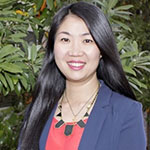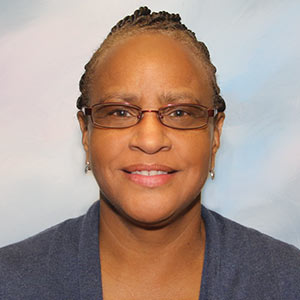Advancing DEI, Social Justice and Global Learning
The crossroads of diversity, inclusion and international education was the focus of a presentation by JY Zhou, director of the Office of Global Engagement, Valerie Hayes, chief officer for Diversity and Inclusion, and Hanni Geist from DAAD: German Academic Exchange Services, at the American Association of Colleges and Universities Conference on Global Learning Reimagined, and at Diversity Abroad Global Inclusion 2021 Conference.
 The Office of Global Engagement provides campus-wide support and coordination of Stockton’s global initiatives, partnerships
and programs. Among other goals, the OGE aims to create a campus hub and culture in
which transformative global learning will be integrated and practiced throughout Stockton’s
teaching and learning, research and service. The Office of Diversity and Inclusion advances and supports institutional diversity, inclusion and social justice efforts
across the University. The DAAD: German Academic Exchange Services is the largest funding organization for the international exchange of students and
researchers, and the exchange views diversity as an opportunity to increase the quality
of its funding activities.
The Office of Global Engagement provides campus-wide support and coordination of Stockton’s global initiatives, partnerships
and programs. Among other goals, the OGE aims to create a campus hub and culture in
which transformative global learning will be integrated and practiced throughout Stockton’s
teaching and learning, research and service. The Office of Diversity and Inclusion advances and supports institutional diversity, inclusion and social justice efforts
across the University. The DAAD: German Academic Exchange Services is the largest funding organization for the international exchange of students and
researchers, and the exchange views diversity as an opportunity to increase the quality
of its funding activities.
With deep reflections of previous practices, international educators realized that diversity and inclusion should be a priority in designing various international education programs. The presenters asserted that to achieve this priority requires breaking down the silos between offices or units of diversity and inclusion and global engagement on campuses. We proposed that all international educators should address the following three critical questions:
- How can universities be instrumental in advancing social justice values through international education?
- How do you design transformative global learning with strategic intentionality, institutional commitment and unit coordination?
- How do you establish partnerships between diversity and inclusion and global engagement?
Zhou drew upon an article in which she and her colleagues described a social justice-based international education practice. She advanced that the virtual exchange provided enormous and unique opportunities to develop global competences, especially for those who have been historically underserved in international education.
Social justice pedagogies provide the necessary framework to ensure that virtual exchange fulfills its promise to create more globally aware individuals and that access to high-impact global learning opportunities is available to every student on campus. (Charles, Zhou, & Scarnati, 2021). Zhou posed international educators should understand and develop the diverse representations of internationalization and global learning (Zhou, 2021a, 2021b).
Zhou proposed to attendees the following strategies to use the curriculum as a mechanism
to tangibly advance social justice values through global learning.
through global learning.
- Teaching from a global perspective
- Articulating global learning goals for courses, majors and institutions
- Linking education abroad experiences to the curriculum at home
- Engaging the ways by which the local is implicated in the global
- Exploring the nexus between intercultural education and anti-racist education
- Empowering faculty to lead in this work through their teaching and research endeavors
Hayes proposed using organizational theories as one way to explore how to establish
partnerships between DEI and global learning. Drawing upon the works of Bolman and Deal (2008),
Smith (2009), and Williams, Berger, & McClendon (2005), she encouraged attendees to
identify gaps between DEI and global learning by thinking of their organizations in
frames.
between DEI and global learning. Drawing upon the works of Bolman and Deal (2008),
Smith (2009), and Williams, Berger, & McClendon (2005), she encouraged attendees to
identify gaps between DEI and global learning by thinking of their organizations in
frames.
- Structural frame where the organization’s hardware in the form of rules, policies, roles, technology and environment exists
- Symbolic frame where the organization’s culture as reflected in its mission, vision, values, symbols, rituals and ceremonies exists
- Human Resource framewhere its people and their development, empowerment and rewards exist
- Political frame where internal interestgroups and other constituents who have divergent and convergent views and needs exist
- Access and success frame where student recruitment, retention and completion exist
- Campus climate and intergroup relations frame where interactions and sense of belonging that faculty, staff and students from different cultural backgrounds and experiences have or feel about the institution in which they live, learn and work
- Education and scholarship frame where quality and quantity of diversity research occurring on campus, as well as the breadth and depth of diversity, equity and inclusion within the curriculum.
- Equity frame where closing achievement gaps
- Student development where co-curricular activities support student learning inside the classroom exists.
Hayes encouraged attendees to find creative ways to build crosswalks between DEI and global learning using institutional mission, vision, values and strategic plans enhanced by an analysis of strengths, weaknesses, opportunities and threats. She informed attendees that no matter where they are on their journey of establishing partnerships between DEI and global learning, asking questions using the organizational frames should guide them towards a more holistic collaborative approach.
References
Bolman, L. G., & Deal, T. E. (2008, 4th ed.). Reframing organizations: Artistry, choice, and leadership. San Francisco, CA: Jossey-Bass.
Charles, H., Zhou, J., & Scarnati, B. (2021). Foregrounding a globalized localism for social justice through the 21st century college curriculum. The Global Impact Exchange (Winter, 2021).
Hayes, V. (2016). Student diversity and organizational culture: A naturalistic case study of student organization involvement in institution focused diversity work. (Doctoral dissertation). Retrieved from ProQuest Dissertations & Thesis Database. (ProQuest No. 10108293).
Smith, D. B. (2009). Diversity’s promise for higher education: Making it work. Baltimore, MD: The Johns Hopkins University Press.
Williams, D. A., Berger, J. B., & McClendon, S. A. (2005). Toward a model of inclusive excellence and change in postsecondary institutions. Washington, DC: Association of American Colleges and Universities.
Williams, D. A., & Wade-Golden, Katrina (2007). The chief diversity officer: A primer for college and university presidents. Washington, DC: American Council on Education.
Zhou, J. (2021a). Understanding international education as a dynamic system. University World News. Retrieved from: https://www.universityworldnews.com/post.php?story=20210118073617320
Zhou, J. (2021b). Global learning: Definition, assessment, and approaches. Journal of Global Education and Research, 6(2), 115-132.


